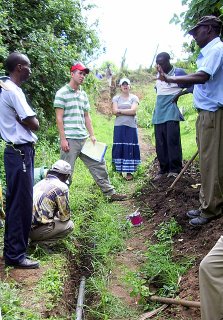 The Gichobo community is well on their way to building a piping system that will greatly reduce the time community members spend to fetch water, releasing them to pursue other income-generating activities.
The Gichobo community is well on their way to building a piping system that will greatly reduce the time community members spend to fetch water, releasing them to pursue other income-generating activities.As part of the project managed by Farming Systems Kenya in partnership with Church World Service, Fundi James Murethi is paid to supervise community volunteers over the laying of pipes. There is already a pump attendant, paid by the water committee, at the borehole to distribute water at 3 Kshs/20L. A second pump attendant is paid by the Ministry of Water. They work together from 8am until 6pm everyday day, allowing one to leave the kiosk to make repairs or solve other distribution problems.
 This farming community is only able to produce food for consumption and not for marketing, due to the lack of water and consistent seasonal rains. The resulting economic instability prevents members from paying dues consistently. However, all are able to afford to pay for the water, since it will support income generating activities like selling cow’s milk.
This farming community is only able to produce food for consumption and not for marketing, due to the lack of water and consistent seasonal rains. The resulting economic instability prevents members from paying dues consistently. However, all are able to afford to pay for the water, since it will support income generating activities like selling cow’s milk.While currently well underway, the project has faced several delays. The community had free and fair elections last year. The newly elected leaders, nine men and two women, had to adjust to their appointments and build relations with FSK and the Ministry of Water. There have also been some tribal clashes over land, and the insecurity was a strain on community resources until last month. The community was also busy in recent months cultivating their own crops, unable to volunteer their time to dig trenches and lay piping until recently.

The water committee’s secretary, Sammy, believes the community will benefit greatly from the piped water. With less distance to travel for cleaner water, “the farmers will have more time to cultivate their crops and possibly go to town to look for extra work.” He also added that the farmers can now spend more time gathering grass for their animals and investing in livestock.
While the borehole is a significant improvement, it will only be sufficient for domestic and livestock use. They hope to have the system up and running by mid-June. Another borehole and more storage tanks would be needed for irrigating crops, a community dream now closer to reality.



No comments:
Post a Comment